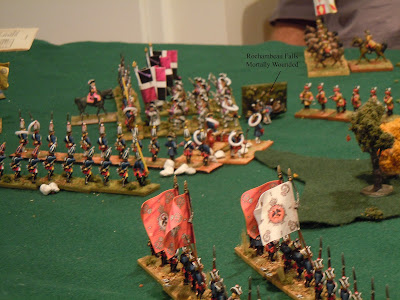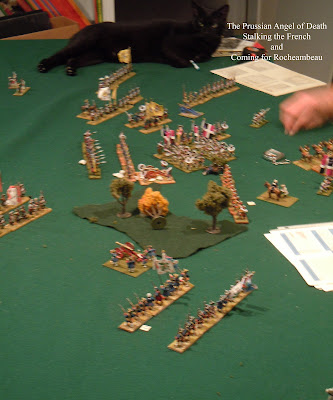The spat between these two armies appears to have developed over the suzerainty of an impoverished village of woodcutters and subsistence farmers (top left of photo).
Due to poor presence of mind the regimental historian failed to collect a full battle report (or even secure a steady post to take observations from!)
The Battle developed with the Prussians seizing the initiative and never losing it throughout the course of the conflict. The Prussian horse boldly extended the Prussian right flank while the infantry and freikorps seized the center anchoring their positions around a series of woods and bringing up their heavy 12 pounders.
The Perfidious French seized the heights (soon to be known as the Donner or "Thunder" heights by the locals due to the resounding sound of the numerous french artillery deployed there) and set up their artillery.
The Prussian converged Grenadiers and later 1st and 3rd Infantry regiments made a flank march on the French right. The rapid evolutions and deployment of the Prussian infantry from Column to Line stymied the French cavalry and artillery sent to secure the French right. A brave 4 pounder battery stood to the last man in the face withering fire from Prussian Grenadiers at near point blank range and was obliterated--the men falling in clusters around their guns. The French cavalry attempted a bold flank march against the advancing Prussians but were again shattered, unable to form into line before the disciplined Prussian Infantry wheeled from columns to lines and poured devastating fire into the hapless French.
This brings us to the faithful hour. Desperate to stem the tide General Claremont orders General de Brigade Rochambeau at the head of three converged attack columns of the Auvergne Regiment (9th) to charge the II/3rd IR advancing in line. Prussian musketry opened the melee with some success, however the weight of numbers was too much and the line broke and ran in the face of numbers and casualties.
Unlucky for the French a fresh battalion of Prussian Grenadiers were formed an awaiting their arrival. Two of Rochambeau's battalions charged home after breaking through the line infantry, but the center column after taking 10% casualties advanced with less ardor and in a classic example of French caprice waited to see the results of their comrades bravery.
With that the French right was broken, their position untenable, and they began to retire from the field.
The course of history was course changed this day. Comte de Rochambeau would no longer lead his 7000 man expeditionary force to the aide of General Washington to some backwater called Yorktown and the cause of Independence was crushed.....
Thus it appears appropriate to end with.... God Save the Queen!




Nice blog thanks ffor posting
ReplyDelete